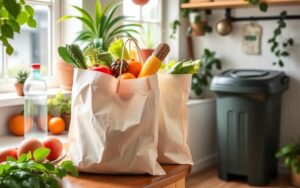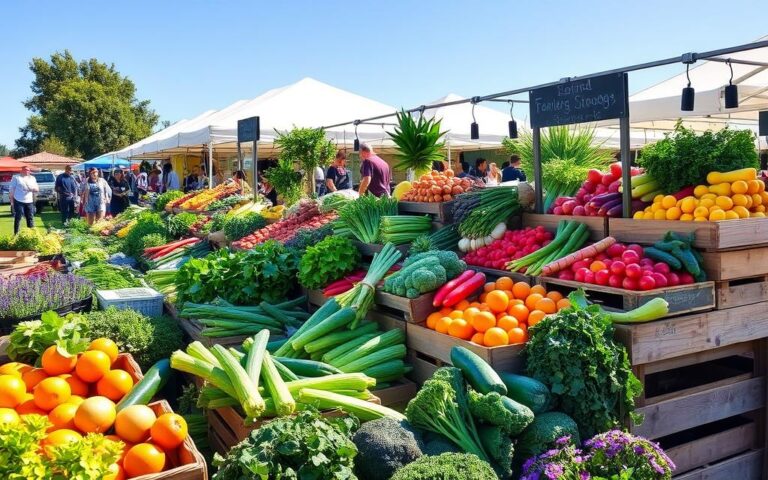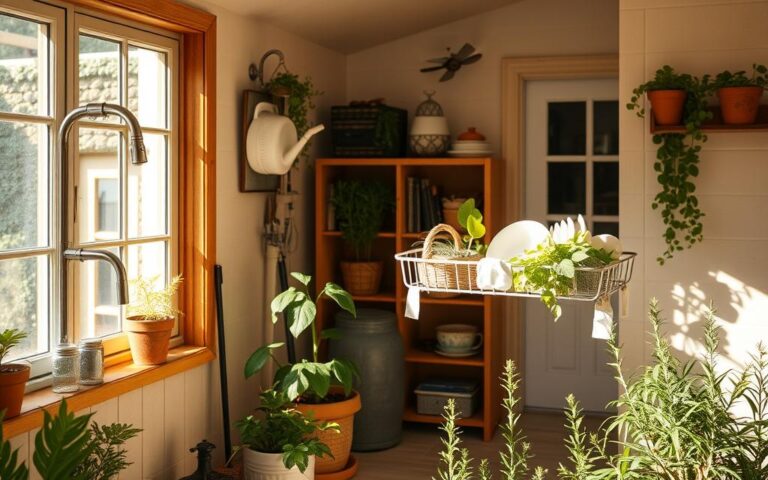Plastic pollution is a huge problem for our planet. It’s high time we act to keep our environment clean. Adopting a sustainable lifestyle helps not only the Earth but also promotes a healthy community spirit.
Every person can play a key role by making small changes in everyday habits. Opt for reusable items like bags and bottles. Support companies that are environmentally responsible. Knowing the facts about plastic pollution can inspire us to make these changes.

Understanding Plastic Pollution and Its Impact
Plastic pollution is now a major environmental issue. We started using plastics widely over the last few decades. This has caused huge problems for our planet and everything living on it.
Every year, countless tons of plastic waste end up in our oceans. This contributes to major environmental damage. It’s a big problem we must tackle.
The effects on ocean life are profound. Sea creatures often eat plastic, thinking it’s food. This can lead to serious health problems and even death. Sea turtles, fish, and birds are especially at risk. Their populations are dropping because of plastic waste.
Plastic pollution doesn’t just hurt sea life; it also impacts humans. Tiny pieces of plastic, called microplastics, get into our water and food. Studies suggest these particles might enter our bodies, posing unknown health risks. The thought of plastic in our meals is alarming. It makes us think about how much plastic we use.
Dealing with plastic pollution is critical. Our heavy use of plastic products might have severe effects. These not only harm the environment but could also affect the health of coming generations.
| Impact Area | Effects on Marine Life | Effects on Human Health |
|---|---|---|
| Ingestion of Plastic | Malnutrition and death in aquatic species | Potential health complications from microplastics |
| Toxic Chemicals | Disruption of reproductive systems | Accumulation in the human body leading to health risks |
| Habitat Destruction | Loss of marine biodiversity | Impact on human ecosystems and food sources |
The Importance of a Plastic-Free Lifestyle
Choosing a plastic-free lifestyle is key for sustainable living and growing environmental awareness. It helps individuals make a positive impact on both local ecosystems and public health. Plastic pollution is a big problem, hurting wildlife and natural places. Using less plastic helps fight climate change.
Many communities worldwide are adopting plastic-free habits with great outcomes. Some places have even banned single-use plastics. This has led to cleaner environments and healthier water sources. Local businesses are also choosing sustainable options, helping customers make better choices. This encourages a culture focused on taking care of the environment.
Anyone wanting to help should look at their own habits. Thinking about our daily choices can show where we can do better. Small steps like using reusable bags and buying in bulk make a big difference. These actions not only support a plastic-free lifestyle but also stand for sustainable living.
| Benefits of a Plastic-Free Lifestyle | Impact on Environment |
|---|---|
| Enhances local biodiversity | Reduces habitat destruction |
| Encourages sustainable products | Lowers carbon footprint |
| Promotes healthier living | Improves public health |
When people start to think about their choices, they see the bigger picture. Choosing a plastic-free lifestyle shows care for our planet. This journey towards sustainability is one we all share. Every step we take together makes the earth a better place.
Simple Swaps to Reduce Plastic Waste
Making simple swaps in your daily life can cut down on plastic waste. Try using reusable products like stainless steel straws and bamboo cutlery instead of one-time use plastics. This small step can lower plastic use and help us live more sustainably.
Another big help is rethinking how we buy things. You can buy in bulk to avoid lots of plastic packaging. Use glass jars or cloth bags to store your foods and other items. Choosing sustainable materials not only cuts plastic waste but also helps our planet be healthier.
A study showed making these easy swaps can cut plastic waste by up to 40%. Sharing this knowledge can help more people join in. This way, we can reduce plastic use as a community.
How to Embrace Eco-Friendly Alternatives
In our world, finding alternatives to plastic is key for sustainability. Many brands work hard to create eco-friendly products that help cut down on plastic trash. By choosing biodegradable cleaning products, reusable bags, and natural personal care items, we can live more sustainably.
Checking products for eco-friendly seals is a smart move. Look for marks like USDA Organic, Fair Trade, or Green Seal. Knowing these standards helps us back brands that care about our planet.
- Cleaning supplies made with natural ingredients
- Reusable items like stainless steel or glass containers
- Eco-friendly personal items, such as bamboo toothbrushes and refillable deodorants
- Compostable trash bags as an alternative to plastic ones
Choosing these eco-friendly options lets us help lower plastic waste and improve sustainability. Every green choice we make adds up to a big difference for our planet and future generations.
| Product Category | Eco-Friendly Option | Benefits |
|---|---|---|
| Cleaning Supplies | Biodegradable detergents | Non-toxic, safe for aquatic life |
| Food Storage | Glass containers | Durable, reusable, and recyclable |
| Dental Care | Bamboo toothbrushes | Biodegradable, sustainable material |
| Garbage Bags | Compostable bags | Enviro-friendly disposal, reduces landfill waste |
Reduce Plastic Waste with Sustainable Materials
The fight against plastic pollution is crucial. Using sustainable materials is key to cutting down plastic waste. By choosing organic cotton, hemp, and biodegradable composites, we can greatly reduce our environmental impact. These eco-friendly options help use less plastic and support healthier ecosystems.
Before buying, think about a product’s life cycle. Hemp needs less water and pesticides than other crops, which helps the environment. By picking items made with organic fibers, we lessen plastic waste and back ethical sourcing.
Biodegradable composites offer a great solution too. They break down easier than plastic, affecting landfills and oceans less. Bamboo and recycled paper are great plastic alternatives. They’re perfect for making sustainable products.
We can switch to eco-friendly options in kitchenware, personal care, and packaging. Making these swaps helps the environment and pushes companies to innovate. By choosing green products, we join a movement for a sustainable future.
Creating a Circular Economy at Home
The circular economy is about cutting down waste by reusing, fixing, and recycling goods. It helps us all make less trash, especially plastic, and care more for our planet.
Doing simple things can have a big effect:
- Reuse old jars and boxes as storage, rather than throwing them away.
- Compost food scraps to keep them from dumps and enrich soil.
- Repair things like clothes and appliances instead of buying new ones.
- Buy second-hand to save cool items and cut down on new stuff made.
Talking about how to live sustainably can also help communities care more. Working with local recycling groups helps everyone commit to a circular economy.
Every small choice adds up and can greatly reduce how much we take from the Earth. Practicing these habits makes our homes greener and promotes thoughtful use of what we have.
The Role of Recycling in Plastic Waste Management
Recycling is key in managing plastic waste. It helps lessen landfill overflow and ocean debris. By recycling, we save energy and work towards a sustainable future. Knowing how recycling works is important to use it well. Most recyclables can turn into new items, making less need for new materials.
Each type of plastic has its own way of being recycled. Hard plastics like bottles are easier to recycle. But, soft plastics like bags are harder because they get dirty and aren’t handled right. To recycle more, we need to sort our trash better. When communities get involved in recycling, it really helps reduce plastic waste.
Some people think all plastics can be recycled. That’s not true; only certain types can. Teaching people what can be recycled helps a lot. It means less wrong items thrown in, making recycling work better. When we all recycle the right way, less plastic ends up in landfills. This shows we can make a big difference together.
| Plastic Type | Common Uses | Recycling Status |
|---|---|---|
| PET (1) | Bottles, containers | Widely recycled |
| HDPE (2) | Containers, bottles | Widely recycled |
| PVC (3) | Pipes, tiles | Rarely recycled |
| LDPE (4) | Bags, liners | Limited recycling |
| PP (5) | Yogurt containers, straws | Limited recycling |
| PS (6) | Foam cups, takeout containers | Not commonly recycled |
| Other (7) | Various items | Not commonly recycled |
Recycling is a strong tool against plastic waste. By teaching about different plastics and urging better sorting, we can all help. Together, we can greatly cut down on plastic waste.
Incorporating Zero Waste Practices in Daily Life
The zero waste movement asks us to change how we buy and use items. It also helps us decrease our impact on the Earth. Below are easy ways to make your daily life more eco-friendly:
- Conscious Purchasing: Pick items with less packaging and buy in bulk when you can. This action greatly reduces plastic waste.
- Meal Planning: Plan your meals to cut back on food waste. Making a shopping list stops extra buys and makes sure you use all ingredients.
- Reusable Products: Use reusable bags, water bottles, and containers. These goods help avoid single-use plastics and lead to a greener lifestyle.
- Composting: Start composting organic waste. This method lowers trash in landfills and makes the soil better.
- Mindset Shift: Think carefully about what you really need before buying. This change raises awareness about our buying patterns and encourages more earth-friendly decisions.
Using these ideas can create great progress in reducing plastic waste. Small, ongoing steps make a big difference in supporting a zero waste life and improving our world.
| Practice | Description | Benefits |
|---|---|---|
| Conscious Purchasing | Choosing products with minimal packaging and buying in bulk. | Less plastic waste generated and cost savings. |
| Meal Planning | Organizing meals weekly to minimize food waste. | Reduced grocery costs and improved food management. |
| Reusable Products | Using items that can be cleaned and reused multiple times. | Reduces reliance on single-use plastics. |
| Composting | Turning organic food scraps into nutrient-rich soil. | Decreases landfill waste and enhances garden health. |
| Mindset Shift | Re-evaluating needs before making purchases. | Encourages responsible consumption and waste reduction. |
Community Initiatives to Combat Plastic Waste
Community projects are key in fighting plastic waste. They help promote green living. Many environmental groups push hard to make people aware and get them involved. Their hard work pays off in reducing plastic pollution.
Local governments help by setting up events. These include clean-up activities and recycling drives. These efforts spread knowledge about the harm of plastic waste. They motivate people to care for their area. Working together, communities form lasting green habits.
There are many success stories from these community actions. For example, neighborhood clean-ups noticeably cut down litter. Workshops teach how to live with less plastic. These efforts build a strong community spirit. They encourage people to be the change in their place.
- Community clean-up drives
- Workshops on plastic-free living
- Local recycling programs
- Environmental education for residents
| Initiative Type | Description | Impact |
|---|---|---|
| Clean-up Events | Organized community efforts to collect litter. | Improved local environment and reduced visible plastic waste. |
| Educational Workshops | Sessions focused on lifestyle changes to reduce plastic dependence. | Increased awareness and adoption of sustainable practices. |
| Recycling Drives | Collection events for recyclables, educating residents on proper disposal. | Higher recycling rates and lower contamination in recycling bins. |
By joining and backing these efforts, people make a big difference. Getting involved does more than cut down plastic waste. It also builds stronger community connections. This makes it a strong strategy for reaching our green goals.
Ways to Educate Others on Reducing Plastic Waste
Educating others about reducing plastic waste helps our environment greatly. To make a better world, we need to share what we know. Here are some tips on how to do it:
- Organize Awareness Campaigns: Start local events to spread the word about plastic waste. Clean-up days and plastic-free challenges get people involved and informed.
- Facilitate Workshops: Workshops let you teach in a hands-on way. It’s more effective than just talking about it.
- Leverage Social Media: Use social media to share facts and resources. This encourages living sustainably and helps spread the message.
- Develop Educational Materials: Make pamphlets, infographics, and newsletters. Explain the effects of plastic pollution and how to use less plastic.
- Encourage School Programs: Work with schools to make sustainability a part of learning. It motivates young people to fight against plastic waste.

Working together and sharing knowledge is powerful. It helps everyone act more responsibly every day. Raising awareness through these efforts is key to making a lasting impact.
| Strategy | Description | Benefits |
|---|---|---|
| Organize Awareness Campaigns | Local events focused on education. | Increases community engagement and participation. |
| Facilitate Workshops | Interactive sessions teaching sustainable practices. | Enhances practical understanding and skills. |
| Leverage Social Media | Use online platforms to promote knowledge. | Wider reach and engagement with diverse audiences. |
| Develop Educational Materials | Informative content for distribution. | Provides lasting reference and encouragement. |
| Encourage School Programs | Partnerships with schools for curriculum integration. | Inspires future generations to embrace sustainability. |
Conclusion
We’re at the end of our journey exploring the issue of plastic waste. It’s important to see how we all play a part in this big challenge. By reducing plastic waste, we help our planet and ensure a better future for coming generations. Small changes in our daily routine can make a big impact.
We need to work together to make a difference. Getting involved in local efforts and spreading the word can help. Every little action helps, and by joining forces, we can create a culture of care for our environment.
Our choices have power. By adopting sustainable habits, we’re not just looking after ourselves but also the planet. Let’s be part of the sustainability movement. Start making a difference today for a brighter tomorrow.
FAQ
How can I reduce plastic waste in my daily life?
To cut down on plastic waste, switch to reusables. Use items like eco-friendly bags, durable containers, and metal straws. Choose brands that value the planet and join your local recycle drive.
What are some effective ways to recycle plastic properly?
Clean your plastic before recycling it, and follow your community’s sorting rules. Knowing plastic symbols helps recycle them correctly.
What is the significance of designing a circular economy at home?
Creating a circular economy at home means less plastic waste. Repair, reuse, and recycle helps. Composting and upcycling items lessens new plastic needs, aiding the planet.
Why is it important to support community initiatives aimed at reducing plastic waste?
Back community projects for a greener world. They increase eco-awareness and inspire us to act together. This cuts down plastic waste significantly.
What eco-friendly alternatives can I use instead of plastic products?
Go green with biodegradable bags, bamboo cutlery, and glass jars. Research eco-conscious brands for smarter choices.
How can I incorporate zero waste practices into my lifestyle?
Adopt zero waste by buying wisely, reducing food waste, and choosing compostable or reusable items. A green mindset drives meaningful lifestyle shifts.
What are the dangers associated with plastic pollution?
Plastic pollution threatens oceans, changes the climate, and puts our health at risk via microplastics. Understanding these risks urges us to live more sustainably.
How can I educate others about reducing plastic waste?
Educate by sharing the reality of plastic pollution, leading eco-campaigns, and running local workshops. Sparking sustainability talks encourages us all to do our part.




